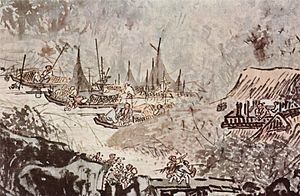
Wu Wei (simplified Chinese: 吴伟; traditional Chinese: 吳偉; pinyin: Wú Wěi; ca. 1459–1508) was a painter of Ming dynasty (1368–1644) China famous for his landscapes.
Wu was born in Wuchang in Hubei province.[1] His style names were Shiying and Ciweng, and his sobriquets were Lufu and Xiaoxian.[2]
Although he was born into a family of scholar-officials and might have pursued a career in the bureaucracy, Wu Wei instead chose to support himself as a painter. He worked as a professional painter in the city of Nanjing, and three emperors summoned him to work as a court painter in Beijing: the Chenghua emperor (r. 1465–87), the Hongzhi emperor (r. 1488–1505), and the Zhengde emperor (r. 1506–21).[3]
Wu Wei is known as a landscape painter, and, at least early in his career, he was inspired by the work of Dai Jin (1388–1462). He also painted figures.[3] Wu painted in a strong, fluent, and uninhibited style, and took on many students to teach.